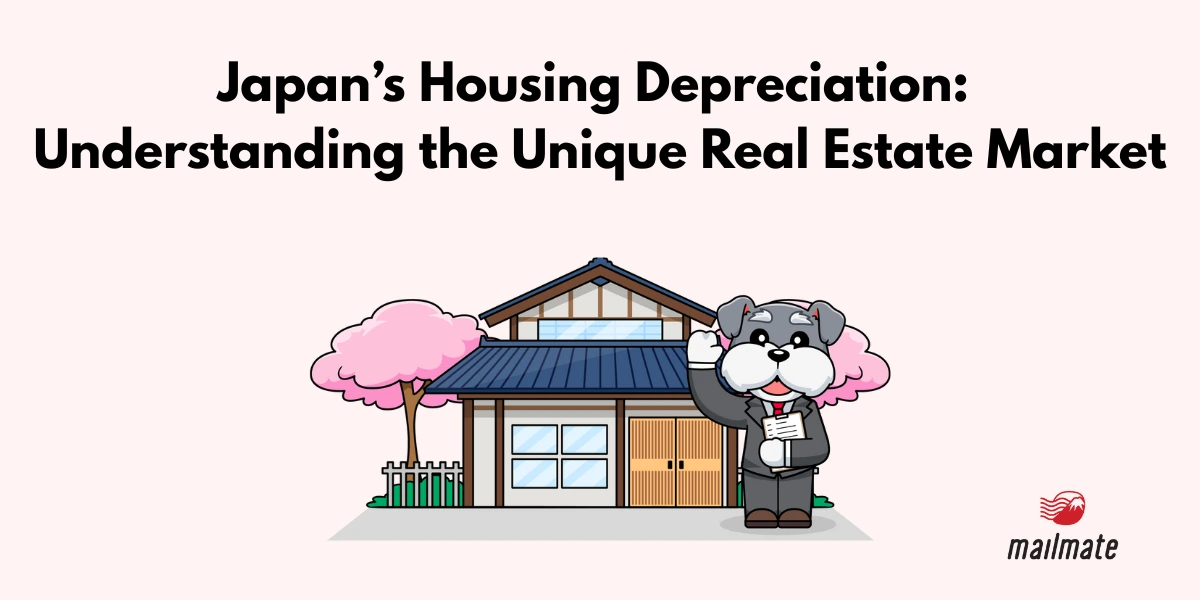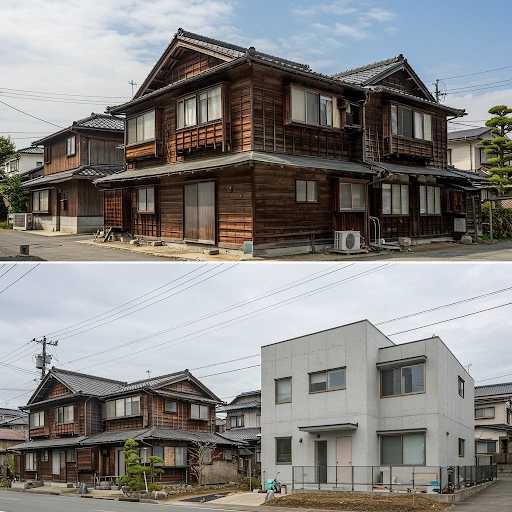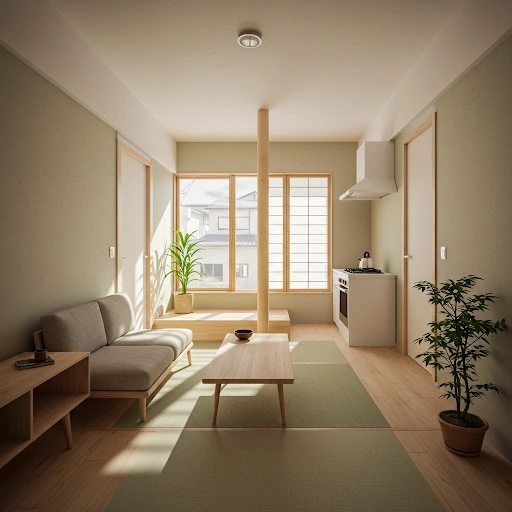Japan’s Housing Depreciation: Understanding the Unique Real Estate Market

Some people may be interested in buying a house in Japan, as many of them might have heard of cheap houses or even free houses in Japan.
Before getting those houses, it is crucial to know about how housing depreciation works in Japan and how it affects homeowners.
This article will explain Japan’s unique housing depreciation system and its impact on tax benefits.
Houses in Japan depreciate rapidly
Japan’s housing market is different from many Western countries where real estate value appreciates over time. In Japan, houses tend to depreciate in value quickly and sometimes become worthless within decades.
The average lifespan of houses in Japan is approximately 30 years, although it depends on the material that was used to build a house.
However, the key characteristic of the Japanese real estate market is that land prices tend to retain or even increase in value, while the purchase price of a brand-new house declines quickly.
This is particularly true in desirable locations with a high demand, such as central Tokyo or other urban areas. In rural Japan, however, land may hold little value, making the Akiya abandoned home problem serious.

Factors contributing to housing depreciation in Japan
The reasons why Japanese houses depreciate so quickly are due to cultural, economic, and legal factors as well as policies set by the Japanese government.
1. Construction & building materials
Many homes in Japan are made of wooden structures, which get damaged easily from natural disasters such as earthquakes and typhoons. In recent years, reinforced concrete has been used for modern homes, but the most common building material in Japanese homes remains wood.

2. Cultural and economic views on homes in Japan
Japanese people tend to view homes as temporary structures, in contrast to the Western concept of homeownership. In modern-day culture, Japanese people prefer everything new rather than used, and this view goes the same with housing.
Older buildings are considered to be unsuitable for modern living, and many residential buildings are torn down after 30 years. People generally keep the land and build new houses with modern designs and updated earthquake resistance standards.
3. Legal and tax implications
The Japanese government dictates statutory useful life regulations, stating that the depreciation period of wooden houses is 22 years, and reinforced concrete buildings are 47 years.
The national tax agency determined these standards for tax purposes, which resulted in the trend of demolishing older homes to build new buildings. These laws make it difficult for property owners to keep high resale value on used houses.
General impact on property owners and investors
Here are some impacts on property owners and investors.
For property owners
Owning an old house in Japan can be burdensome financially, as maintaining it does not guarantee a resale value (unlike real estate investments in other countries).
For foreign and domestic investors
Despite the rapid depreciation of homes, foreign investors have been increasingly entering the Japanese real estate market, especially in desirable areas like central Tokyo. The urban areas do have a lot of investment opportunities, and the land values usually increase over time.
However, foreign investors need to be cautious about real estate investment as there are countless factors involved in the housing market in Japan. It is highly recommended to reach out for professional help to navigate the market.
👉Read also: English-Speaking Real Estate Companies in Japan for Renting and Buying a Property
Tax-related impact for investment properties in Japan
Housing depreciation has a huge impact on those who own a property that generates income.
There is a system of accounting called 減価償却 genka shoukyaku, which is an accounting process of allocating the cost of a tangible asset over its useful life.
What is 減価償却 genka shoukyaku?
Depreciation (genka shoukyaku) is an accounting process in which the purchase cost of a fixed asset is recorded as an expense in installments over the period of its usable life.
Assets whose value decreases over time, such as building, equipment, machinery, and fixtures, are called “depreciable assets.” Since depreciable assets generally deteriorate over time, the depreciation process recognizes its gradual deterioration as an expense and reduces its book value.
Building is a depreciable asset, but land is not
Building is a depreciable asset, but land cannot be depreciated because its value does not decrease over time.
For buildings, there is “useful life” of the property set by the government. The useful life depends on the structure of the property.
Structure |
Useful life |
|---|---|
|
Steel reinforced concrete (SRC) Reinforced concrete (RC) |
47 years |
Steel |
34 years |
Light gauge steel |
19 years |
Wood |
22 years |
Why is depreciation important for investors?
Depreciation (genka shoukyaku) is crucial for real estate investors because it greatly impacts tax savings and overall investment returns.
1. Tax deduction benefits
Depreciation expenses have a tax-saving effect because income is calculated by subtracting depreciation expenses from income from real estate such as apartments and condominiums, thereby reducing taxable income.
The expenses for real estate income, such as fixed asset tax, insurance premium, and repair costs, are the expenses you have to actually pay in that period. However, depreciation expenses can be deducted without actual expenditure. Used buildings with short useful lives have a large amount of depreciation expenses, so they have a higher tax-saving effect.
2. Tax benefits when selling property
Used properties depreciate faster than new ones, and this allows for larger deductions in a shorter period of time. In the long run, this can be beneficial for tax savings.
For example, if both the used building and the new building are purchased at ¥40 million and sold for ¥35 million after 20 years:
Used building: Depreciates completely in 20 years, recording ¥40 million in expenses but facing a ¥35 million taxable capital gain upon sale
New building: Depreciates only ¥16 million over 20 years, leading to a lower depreciation deduction but a smaller taxable gain of ¥11 million upon sale
Since business and rental income are subject to progressive tax rates, while capital gains tax is fixed at 15% for properties held over five years, shorter depreciation periods tend to result in overall larger tax savings.
👉Read also: Real Estate Tax in Japan: An Easy, Quickstart Guide
Note: For property owners not living in Japan, MailMate provides a tax representative service, allowing you to take care of the acquisition tax without needing to be physically present at your property in Japan.
Future of Japan’s housing market
The depreciation trend might change in the future.
New trends in housing
Because of the current situation with the Japanese economy, Japanese people have started to show some changes in housing trends. Especially among young people, the demand for small rooms and compact living spaces is growing, and due to sustainability movements, environmentally friendly construction materials may influence Japanese buildings in the future.

Government and market reforms
A Tokyo architectural historian claims that Japanese policies need to shift to encourage renovations rather than demolition. If policies change, the Japanese housing market trend might become the same way as Western countries.
In closing
If you are a real estate investor interested in Japan's real estate market or considering buying a second home in Japan, it's essential to understand Japan's housing depreciation.
MailMate's fluently bilingual tax representative service helps property owners stay up to date on their real estate tax bills by liaising between clients and the local government.

The service includes the following features:
Tax representative for annual real estate tax payments
Domestic point of contact for authorities (required by law)
Bill pay support for property tax payments
Tax notifications with English summaries
A virtual mailbox to receive the mail that arrives at your Japanese property
Manage important property documents and notifications in one place
Other services MailMate offers include utility and Internet setup of your Japanese property!
Founded in 2019, MailMate has simplified property ownership for foreigners living abroad and is an increasingly popular option recommended by users and well-known industry figures.

Additionally, if you use MailMate's tax representative service for property owners, MailMate will take care of filing the tax representative form with the relevant tax office on your behalf.
Navigate Japan's tax system with an experienced tax representative service tailored for foreign property owners!
Spending too long figuring out your Japanese mail?
Virtual mail + translation services start at 3800 per month. 30-day money-back guarantee.

